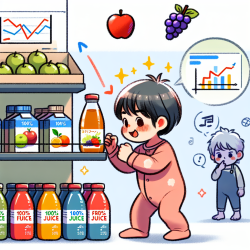Introduction
As a speech-language pathologist, understanding the nutritional habits of children can be crucial in addressing not only speech and language development but also overall health outcomes. A recent study titled Limited consumption of 100% fruit juices and sugar sweetened beverages in Japanese toddler and preschool children sheds light on how beverage consumption patterns differ significantly between Japanese and North American children. This study provides valuable insights that can be used by practitioners to improve health outcomes in children.
Understanding the Data
The study highlights a stark contrast in the consumption of sugar-sweetened beverages (SSBs) and 100% fruit juices between Japanese and North American children. Japanese toddlers and preschoolers consume these beverages at much lower rates compared to their North American counterparts. This difference is significant because high consumption of SSBs is linked to increased rates of childhood obesity, a growing concern in North America.
Key Findings
- Japanese children have lower daily consumption of SSBs and 100% fruit juice compared to North American children.
- Sweetened dairy drinks are more commonly consumed by Japanese children, which may offer nutritional benefits such as calcium and probiotics.
- The lower intake of SSBs in Japanese children may contribute to their lower obesity rates.
Implications for Practitioners
For practitioners, these findings highlight the importance of encouraging healthier beverage choices in children. Here are some strategies to consider:
- Promote water and milk as primary beverages for children.
- Educate parents on the potential negative impacts of high SSB consumption.
- Encourage the inclusion of sweetened dairy drinks, which may provide additional health benefits.
Encouraging Further Research
While this study provides a comprehensive comparison, further research is needed to explore the long-term impacts of beverage choices on childhood obesity and overall health. Practitioners are encouraged to stay informed about new research findings and consider how they can be applied in their practice to improve outcomes for children.
Conclusion
The data-driven insights from this study offer a clear message: beverage choices play a crucial role in managing childhood obesity. By understanding and applying these findings, practitioners can contribute to healthier futures for children.
To read the original research paper, please follow this link: Limited consumption of 100% fruit juices and sugar sweetened beverages in Japanese toddler and preschool children.










